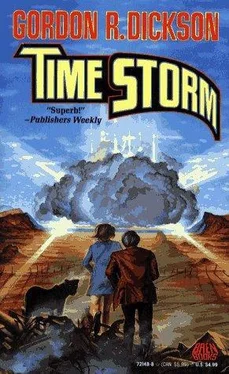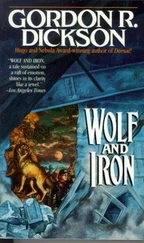Gordon Dickson - Time Storm
Здесь есть возможность читать онлайн «Gordon Dickson - Time Storm» весь текст электронной книги совершенно бесплатно (целиком полную версию без сокращений). В некоторых случаях можно слушать аудио, скачать через торрент в формате fb2 и присутствует краткое содержание. Год выпуска: 1992, ISBN: 1992, Издательство: Baen Books, Жанр: Фантастика и фэнтези, на английском языке. Описание произведения, (предисловие) а так же отзывы посетителей доступны на портале библиотеки ЛибКат.
- Название:Time Storm
- Автор:
- Издательство:Baen Books
- Жанр:
- Год:1992
- ISBN:0-671-72148-8
- Рейтинг книги:4 / 5. Голосов: 1
-
Избранное:Добавить в избранное
- Отзывы:
-
Ваша оценка:
- 80
- 1
- 2
- 3
- 4
- 5
Time Storm: краткое содержание, описание и аннотация
Предлагаем к чтению аннотацию, описание, краткое содержание или предисловие (зависит от того, что написал сам автор книги «Time Storm»). Если вы не нашли необходимую информацию о книге — напишите в комментариях, мы постараемся отыскать её.
Time Storm — читать онлайн бесплатно полную книгу (весь текст) целиком
Ниже представлен текст книги, разбитый по страницам. Система сохранения места последней прочитанной страницы, позволяет с удобством читать онлайн бесплатно книгу «Time Storm», без необходимости каждый раз заново искать на чём Вы остановились. Поставьте закладку, и сможете в любой момент перейти на страницу, на которой закончили чтение.
Интервал:
Закладка:
Apparently they did not need as much protection from the weather as we needed. When I asked about this, Obsidian demonstrated how he could envelop himself in a sort of cushion of invisible warmth, apparently just by wanting to do it—although he insisted that the heat was generated by mechanical, not mental, means. But beyond this, it was obvious to me early in our discussions that he had a far greater tolerance for temperature extremes and the discomfort of his physical surroundings than I did. In spite of the chilliness of the spring mornings or the heat of the afternoon, he showed the same indifference to the temperature and wore the same kilt, no more, no less. It was not until the third day that I discovered he was only wearing that out of courtesy to us, it having been established by them that we had some kind of clothing taboos.
It was about the third day, also, that a great many other things began to make sense. Surprisingly, my ability to communicate improved much more swiftly than did his; so much so, in fact, that he commented on it with unconcealed awe. The awe was almost more unsettling to me than the other mysteries about him. It gave me an uneasy feeling, mentally, to think that these people of the far future might not be so superior to us after all; that they might, in fact, be inferior in some ways. Obsidian and I worried over the communication discrepancy together and finally concluded that, paradoxically, Obsidian was in a sense being inhibited by the fine command of the spoken language he had exhibited the first time he appeared.
It emerged that his group was not used to translating concepts. Sounds and symbols, yes. These varied from race to race among them in infinite variety. But, just as they could agree on the unique identity of any single individual, they were apparently able to agree on the perfect value of any concept, so that translation, in that sense, was never necessary. When we first appeared, they had set up recording devices to pick up every sound made in our community and channelled these into a computer-like device which had sorted them out and deduced the rules and vocabulary of our language, with the observed or implied denotative values of each sound. With this done, they had pumped the information into the head of Obsidian and sent him to talk to us, confident that he could now communicate.
Only, he had run into trouble. The sounds he used turned out to have had meanings over and above what the language computer had deduced. In short, Obsidian and his fellows were in the uncomfortable position of people who have grown up with a single set of concepts, thinking there was no other, and who had then run into an entirely different set—ours. They were like the person who grows to adulthood before he discovers that there are other languages than the one he knows, and then has to struggle emotionally with the concept that anybody else can prefer some outlandish sound to what he knows in his heart of hearts is the only “real” sound for a thought or thing.
Because of this, his plans had gone awry. It had been planned that he would drop in on us, pump us dry of all other relevant data on us, feed that also into the computer, and come up with patterns of us in all departments, from which it could be figured how to adjust us to the culture of their time, if this was possible. Instead, here he was floundering at absorbing my patterns while I was picking up his, hand over fist.
Well, not exactly hand over fist. His patterns, unlike ours, were all logical and logically interrelated, which gave me a great advantage. But there were also abilities and concepts in his area that he took for granted and I could not get him to talk about because I had no way of describing what I was after.
It was not until the fourth day that I finally achieved a breakthrough in that respect; and it happened for a strange reason. That mind of mine, which could never leave a problem alone but must keep worrying at it and chewing it over until either mind or problem cracked wide open, had been at work on the two enigmatic conversations I had had with Marie, just before she left, and Ellen, the day that Obsidian had appeared.
I still could make no sense of what they said. For all my efforts to understand, my comprehension slid off the memories of their words to me as if both had been encased in glass. At the same time I had a reason to keep working at them, now. There was something in me which I evidently could not see, as I could not see my own eyeballs, except in a mirror, or the back of my head. There must be something in me, I thought, like a dark area, a shadow cast by the sensing mechanism itself, that was keeping me from the closeness I wanted to have with other people—and of all people, Ellen. I had been trying all sorts of approaches to the problem, trying to find some way of sneaking up on the unseeable, so to speak; and it occurred to me suddenly as I was talking to Obsidian that there might be a similarity between this problem and my problem of communication with him.
I had tried evoking the golden light as a means of reaching an understanding of Ellen. But I had found that when I tried to reach for the feeling of unity with all things for that reason, it was as it had been in the plane after leaving Paula’s camp—I could not evoke the state of unity. It came to me now that it would do no harm to try for it once more in the case of Obsidian and his people, where the emotional roots concerned did not go so deeply into the dark of my own soul.
So I tried. It helped that I had grown to like Obsidian in the last few intense days of talking. I thought I could almost grasp what he described as that unique identity element by which all other beings of his time recognized him. So I picked a moment when he was trying to explain to me what among them took the place of family structure, as we in our community knew it. I watched him as he talked, seated cross-legged on the ground. His face was animated and his hands wove patterns in the air. He had the attribute of seeming to be alive with energy even while he was obviously without tension and relaxed. It was an ability I had seen before in casual encounters with professional athletes in top condition.
I was hardly listening to what he said. That is, my mind was making automatic note of it, but I was comfortably aware of the fact that the tape recorder was catching his words and I would be able to review them again this evening in the quiet of the summer palace library. Most of my attention was concentrated on him as a complete entity; a sound-making, limb-moving individual extending energy to me in the form of sound and gesture. I squinted, mentally, to focus in on him in this sense; and when I had him in focus, slid on top of his image before me the emotional/intellectual gestalt that was my friend Obsidian, as I knew him.
The two melted together; and as they did I was able for the first time to take a step back from him and the present moment. I kept my point of view at that distance and slowly let the rest of the day soak into me.
We sat just outside the summer palace and I had my back to it; so that I looked past Obsidian, across the open stretch of the landing area and out over the descending slope of the trees to the town below and the tall grass marching in all directions to the horizon. It was, for once, a perfectly clear day; there was not a cloud in sight. But a small, cool wind was wandering back and forth across the mountainside where we sat.
I saw the treetops moving to it and felt the intermittent light touch of it on my face and hands, cancelling out now and again the warmth of the steady afternoon sunlight. It was too early for insects; but down on the wooded slope below me, a cloud of specks that were small birds burst up unexpectedly as I watched, to swarm dark against the far bright sky for a moment like a cloud of gnats, and then settled back down out of sight into the dark mass of the leaves below them again.
Читать дальшеИнтервал:
Закладка:
Похожие книги на «Time Storm»
Представляем Вашему вниманию похожие книги на «Time Storm» списком для выбора. Мы отобрали схожую по названию и смыслу литературу в надежде предоставить читателям больше вариантов отыскать новые, интересные, ещё непрочитанные произведения.
Обсуждение, отзывы о книге «Time Storm» и просто собственные мнения читателей. Оставьте ваши комментарии, напишите, что Вы думаете о произведении, его смысле или главных героях. Укажите что конкретно понравилось, а что нет, и почему Вы так считаете.












